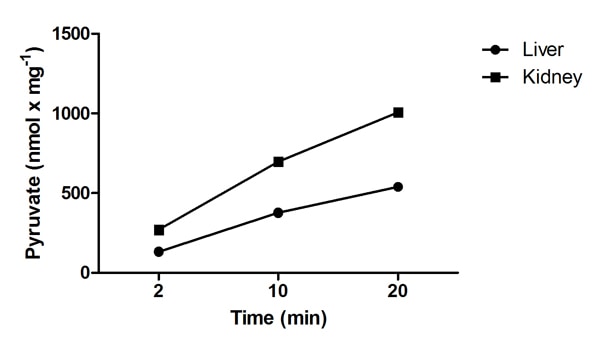Pyruvate Kinase Assay Kit (ab83432)
Key features and details
- Assay type: Enzyme activity (quantitative)
- Detection method: Colorimetric/Fluorometric
- Platform: Microplate reader
- Assay time: 40 min
- Sample type: Cell culture supernatant, Other biological fluids, Plasma, Serum, Tissue, Urine
- Sensitivity: 0.1 mU/ml
Overview
-
Product name
Pyruvate Kinase Assay Kit -
Detection method
Colorimetric/Fluorometric -
Sample type
Cell culture supernatant, Urine, Serum, Plasma, Other biological fluids, Tissue -
Assay type
Enzyme activity (quantitative) -
Sensitivity
= 0.1 mU/ml -
Assay time
0h 40m -
Product overview
Pyruvate Kinase Assay Kit ab83432 provides a simple, direct and automation-ready assay for measuring pyruvate kinase activity in cell culture supernatant, plasma, serum, tissue, urine and other biological fluids (not validated for use with whole blood).
In the pyruvate kinase assay protocol, PEP and ADP are catalyzed by pyruvate kinase to generate pyruvate and ATP. The generated pyruvate is oxidized by pyruvate oxidase to produce color (absorbance 570 nm) and fluorescence (Ex/Em 535/587 nm). Since the increase in color or fluorescence intensity is proportional to the increase in pyruvate amount, the PK activity can be accurately measured.
The kit detects 0.1 mU/ml pyruvate kinase.
Pyruvate kinase assay protocol summary:
- add samples and standards to wells
- add reaction mix
- analyze with microplate reader immediately and after 10-20 min -
Notes
Pyruvate kinase (PK, EC 2.7.1.40) is an enzyme involved in glycolysis. It catalyzes the transfer of a phosphate group from phosphoenolpyruvate (PEP) to ADP, yielding one molecule of pyruvate and one molecule of ATP. Lack of pyruvate kinase will slow down the process of glycolysis which causes the disease known as pyruvate kinase deficiency.
Abcam has not and does not intend to apply for the REACH Authorisation of customers’ uses of products that contain European Authorisation list (Annex XIV) substances.
It is the responsibility of our customers to check the necessity of application of REACH Authorisation, and any other relevant authorisations, for their intended uses. -
Platform
Microplate reader
Properties
-
Storage instructions
Store at -20°C. Please refer to protocols. -
Components Identifier 100 tests OxiRed Probe Red 1 x 200µl PK Assay Buffer WM 1 x 25ml PK Enzyme Mix (Lyophilised) Green 1 vial PK Positive Control (Lyophilised) Blue 1 vial PK Substrate Mix (Lyophilised) Purple 1 vial Pyruvate Standard (100 nmol/µl) Yellow 1 x 100µl -
Research areas
-
Relevance
Pyruvate kinase (PK, EC 2.7.1.40) is an enzyme involved in glycolysis. It catalyzes the transfer of a phosphate group from phosphoenolpyruvate (PEP) to ADP, yielding one molecule of pyruvate and one molecule of ATP. Lack of pyruvate kinase will slow down the process of glycolysis which causes the disease known as pyruvate kinase deficiency. -
Cellular localization
Cytoplasmic and Nuclear -
Alternative names
- CTHBP
- EC 2.7.1.40
- MGC3932
see all
Images
-
 Functional Studies - Pyruvate Kinase (PK) Assay Kit (ab83432) Image from Liu J et al., PLoS One. 2014;9(3):e91606. Fig S2(A).; doi: 10.1371/journal.pone.0091606. Reproduced under the Creative Commons license http://creativecommons.org/licenses/by/4.0/
Functional Studies - Pyruvate Kinase (PK) Assay Kit (ab83432) Image from Liu J et al., PLoS One. 2014;9(3):e91606. Fig S2(A).; doi: 10.1371/journal.pone.0091606. Reproduced under the Creative Commons license http://creativecommons.org/licenses/by/4.0/PC-3 and MCF-7 cells were treated with OA at the indicated doses and PK activity was determined 12 hr after OA treatment using ab83432. The average values of three independent experiments were shown as Mean ± SD. *, P
-
Pyruvate measured in biological fluid after 2 min, 10 min and 20 min incubation time showing quantity (nmol) per ml of tested sample.
-
Pyruvate measured in mouse tissue lysates after 2 min, 10 min and 20 min incubation time showing quantity (nmol) per mg of tested sample.
-
Pyruvate measured in cell lysates after 2 min, 10 min and 20 min incubation time showing quantity (nmol) per 1 mln of tested cells.
-
Colorimetric standard curve: mean of duplicates (+/- SD) with background reads subtracted.
-
Fluorometric standard curve: mean of duplicates (+/- SD) with background reads subtracted.
-
Pyruvate kinase samples time line using ab83432.
-
Pyruvate standard curve using ab83432.



















